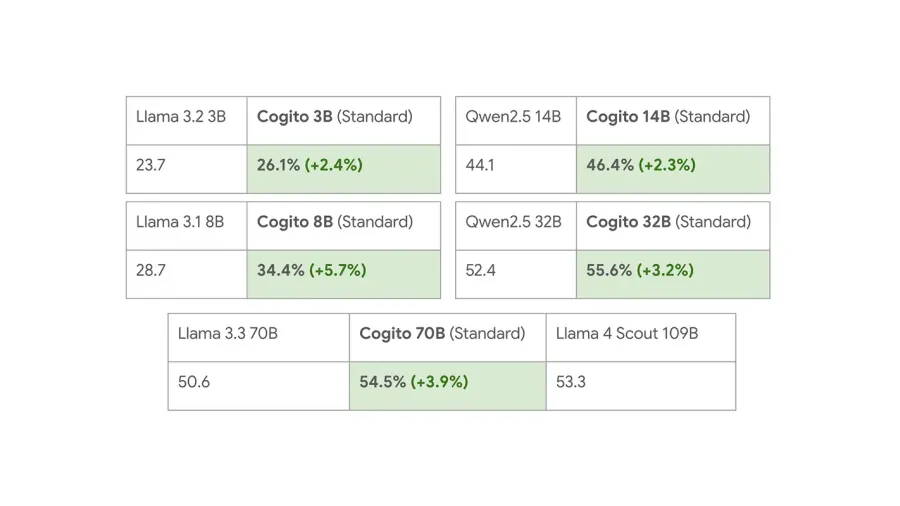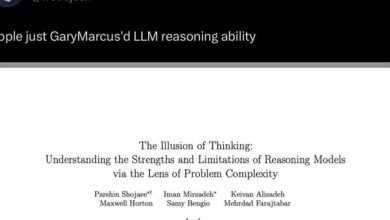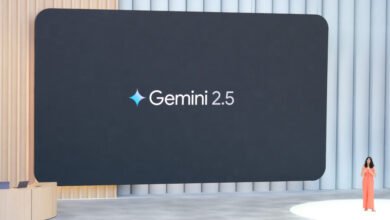Deep Cogito Unveils Hybrid AI Models with Advanced Reasoning Capabilities

▼ Summary
– Deep Cogito has introduced hybrid AI models, called Cogito 1, which can switch between reasoning and non-reasoning functionalities to optimize performance and computational efficiency.
– The Cogito 1 models range from 3 billion to 70 billion parameters, with plans to release models up to 671 billion parameters, indicating higher problem-solving capabilities with more parameters.
– These models were developed using Meta’s Llama and Alibaba’s Qwen models as a foundation, enhanced with new training techniques to improve performance and enable reasoning toggles.
– Benchmarking results show that the largest model, Cogito 70B, outperforms DeepSeek’s R1 in certain evaluations and Meta’s Llama 4 Scout model on general-purpose AI tests when reasoning is disabled.
– Deep Cogito, founded in June 2024 by Drishan Arora and Dhruv Malhotra, aims to develop general superintelligence, with their models available via APIs on cloud platforms Fireworks AI and Together AI.
A newly emerged company, Deep Cogito, has stepped out of stealth mode, introducing a suite of AI models capable of toggling between “reasoning” and non-reasoning functionalities.
AI models with reasoning capabilities, such as OpenAI’s o1, have demonstrated significant potential in fields like mathematics and physics by methodically verifying their solutions to complex problems. However, this enhanced reasoning ability comes at the expense of increased computational demands and latency. To address this, research labs like Anthropic are developing “hybrid” model architectures that integrate reasoning components with conventional, non-reasoning elements. These hybrid models can quickly respond to straightforward queries while dedicating more processing power to complex questions.
Deep Cogito’s family of models, known as Cogito 1, are all hybrid models. The company asserts that their models surpass the best open models of similar sizes, including those developed by Meta and Chinese AI startup DeepSeek.
“Each model can provide direct answers or engage in self-reflection before responding, akin to reasoning models,” the company detailed in a blog post. “[All models] were created by a small team in roughly 75 days.”
The Cogito 1 models vary in size from 3 billion parameters to 70 billion parameters, with plans to release models up to 671 billion parameters in the upcoming weeks and months. Generally, the number of parameters correlates with the model’s problem-solving prowess, with more parameters indicating higher capability.
It’s important to note that Cogito 1 wasn’t developed entirely from scratch. Deep Cogito built upon the foundation of Meta’s open Llama and Alibaba’s Qwen models, enhancing them with novel training techniques to improve performance and enable reasoning toggles.
Internal benchmarking results reveal that the largest model, Cogito 70B, surpasses DeepSeek’s R1 reasoning model in certain mathematics and language evaluations. Additionally, Cogito 70B, when reasoning is disabled, outperforms Meta’s recently released Llama 4 Scout model on the LiveBench general-purpose AI test.
All Cogito 1 models are accessible for download and use via APIs on cloud platforms Fireworks AI and Together AI.

“Presently, we are in the initial stages of our scaling curve, having utilized only a fraction of the computing resources typically allocated for traditional large language model post/continued training,” Cogito stated in their blog post. “Looking ahead, we are exploring additional post-training methods for self-improvement.”
According to California State filings, San Francisco-based Deep Cogito was established in June 2024. The company’s LinkedIn page identifies Drishan Arora and Dhruv Malhotra as the co-founders. Malhotra previously served as a product manager at Google AI lab DeepMind, focusing on generative search technology, while Arora was a senior software engineer at Google.
Deep Cogito’s investors, including South Park Commons as per Pitchbook, have high aspirations to develop “general superintelligence.” The founders envision this as an AI capable of outperforming humans in most tasks and uncovering new, unimaginable capabilities.
(Source: TechCrunch)





